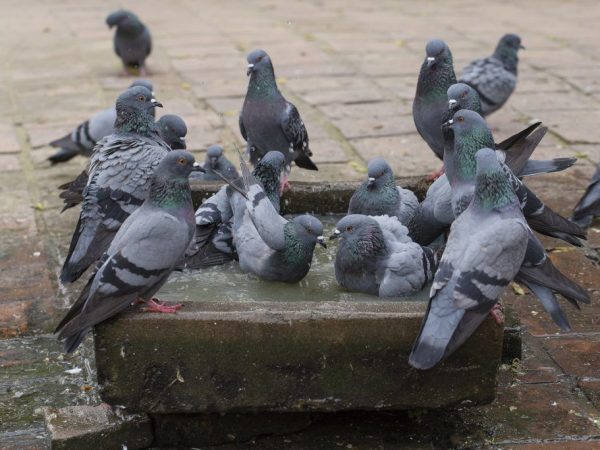Correct treatment of psittacosis in pigeons
Pigeon psittacosis is a common disease. The disease damages the main systems of life (respiratory and motor), and also causes an increase in the liver and spleen. More than 150 species of birds are exposed to its negative effect, the most common of which is the rock dove, which lives on all continents.

Ornithosis in pigeons
The carriers are intracellular parasites - chlamydia. The infection can harm not only animals, but also provoke chlamydia in humans. Ornithosis in pigeons should be treated at the first sign of the disease. Symptoms and treatment of the disease psittacosis in pigeons is easy to identify if you regularly observe the behavior of birds.
Characteristic
When chlamydia enters the pigeon's habitat, the virus enters the body through the respiratory system and infects cells. Excreted, chlamydia continues to live in feces for a week and infect the rest. In this case, the sick pigeon must be moved to a separate enclosure for maintenance. Chlamydia is also dangerous for humans: the disease is transmitted by airborne droplets. In order to protect yourself from the virus, you should use various methods of protection:
- isolation of infected pigeons;
- disinfection of the room in which the birds are;
- close contact masks;
- carrying out preventive actions.
Sick pigeons have a good chance of recovery. Prevention should be carried out in advance to reduce disease rates. Chlamydiae are very resistant to temperature extremes and do not make it possible to notice symptoms at the initial stage, which leads to a massive disease of birds. For prophylaxis and disinfection use:
- formalin;
- phenol;
- chloramine;
- lime;
- carbolic acid.
You also need to keep in mind regular house cleaning and general hygiene.
Symptoms
Ornithosis in pigeons manifests itself in different symptoms. This mainly depends on the condition of the bird and the stability of the immune system. The incubation period ranges from 6 to 17 days. The first lesions with psittacosis can be noticed by the behavior of the pigeon. Ornithosis in pigeons can provoke mood swings and passivity, as a result of which there is a refusal to eat. Such symptoms of psittacosis in pigeons are characteristic in the initial stages. It is very important to treat an individual when the first signs of the disease appear.
There are 2 types of psittacosis:
- acute;
- chronic.
In the acute form, the respiratory systems are damaged, and in the atypical acute violation of all systems occurs without damage to the lungs.
The eyes are the first to suffer from chlamydia infections. The pigeon reacts poorly to light, its rings around its eyes are extended. The eyeball fills with viscous mucus and becomes crusty. Further, the mucus becomes purulent, and the area around the eyes becomes bald.
Over the course of several days, the pigeon noticeably loses weight and loses its appetite, the pet becomes inactive and lethargic. Chlamydia severely affects the lungs, causing a severe wet cough and loud, clear breathing.The next symptoms of psittacosis are loose stools, immobilization and, as a result, paralysis caused by damage to the motor system.
Treatment
Ornithosis in pigeons should be promptly diagnosed and treated with antibiotics. Treatment in the last stages is a complex process that requires constant supervision and quality care. The first step is to enter quarantine and disinfect the poultry house. It is necessary to completely wash the cells with special cleaning agents and change the flooring, if any. In the early stages, treatment is not difficult or difficult as long as the disease is correctly identified. Psittacosis is divided into 2 stages of impact on the body:
- antibiotic treatment;
- vitamin recovery.
The antibiotic is poured into the feed of the birds and the feeding is carried out 7 times a day. The proportions are determined based on the weight of the chicken.
The antibiotic should only be prescribed by a veterinarian, taking into account the condition and weight of the bird. The dosage for each individual may be different, even if they have the same disease. After antibiotic treatment, pigeons need urgent vitamin recovery with various drugs. Treatment needs to be completed as soon as possible, as the cost of one or more birds is significantly different from the cost of the whole flock.
Useful Tips
In order not to bring the avian virus to a chronic or acute stage, it is recommended to follow all the rules for the care and maintenance of birds, as well as to carry out regular prophylaxis. It is necessary to keep the birds clean, disinfect the entire room in a timely manner, and carefully remove pigeon droppings. It is recommended to clean the poultry house and feeders with the use of special disinfectants. You also need to control the supply of fresh food and water.
If the water is contaminated, you should change it to a new one, since pigeons can pick up infections and various viruses through dirty water. It is necessary to carry out regular vaccination of birds in a timely manner. Every 6-12 months, it is necessary to show the birds to the veterinarian for a professional examination. If you follow the simple rules for keeping pigeons, the chances that the flock will develop psittacosis are reduced.


